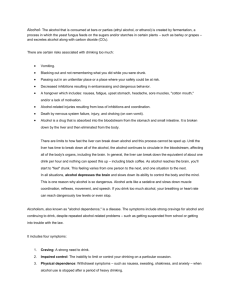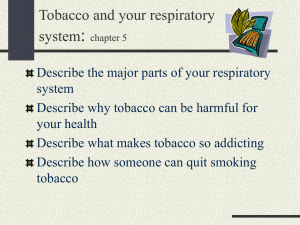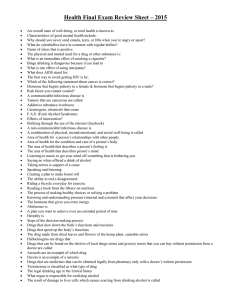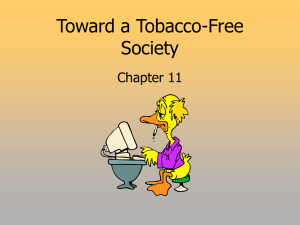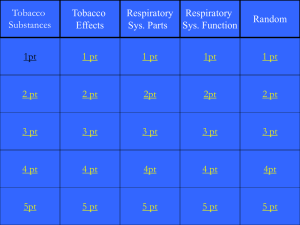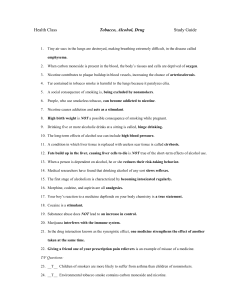Alcohol, Tobacco & Adolescents
advertisement
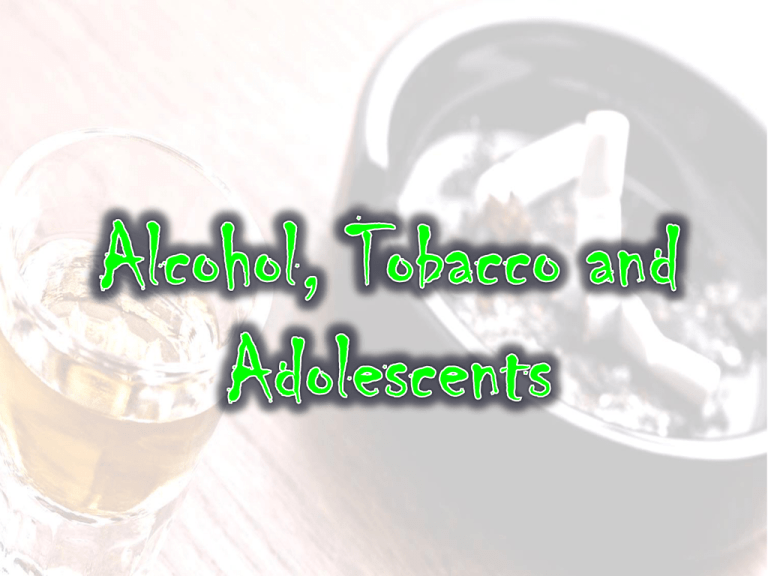
Decide if each question is TRUE or FALSE. A single drink of alcohol can affect you. True Alcohol passes through the lining of the stomach into the bloodstream within 5 to 10 minutes. True Alcohol moves through the bloodstream to every organ in the body. True Drinking alcohol impairs the memory and learning ability of young people more than adults. True Alcohol can have lasting effects on the developing brains of young people. True Alcohol can kill you. True Alcohol can hurt you, even if you are not the one drinking. True https://www.youtube.com/watch?v=Bgl7jXtLAwY Alcohol is a factor in nearly half of America's murders, suicides and accidental deaths. It is estimated that over 3 million teens between the ages of 14 and 17 in the United States today are alcoholics. 500,000 Americans who are dependent on alcohol are between the ages of 9 and 12. • Research indicates that adolescents who abuse alcohol may remember 10% less of what they have learned than those who don’t drink. Liver of an alcoholic Healthy Liver ALCOHOL IS A DEPRESSANT The more you drink, the more "depressed" your brain activity becomes. As you continue to drink and alcohol levels increase, specific parts of the brain are affected more significantly. The part of your brain that controls advanced functions like recognition, vision, reasoning and emotion. At the lowest levels, alcohol lowers inhibitions, and affects judgment. As alcohol levels increase, vision, movement, and speech are impaired. This occurs at a blood alcohol level of .01% -.30%. The part of your brain that is involved with coordinating movement. Alcohol consumption causes problems with coordination, reflexes, and balance This occurs at a blood alcohol level of .15-.35%. The part of your brain that controls basic survival functions such as breathing and heartbeat. When you've consumed so much alcohol that the medulla is affected, your brain's ability to control respiration and heart rate is severely diminished. Your heart rate can drop and breathing cease, causing death, at blood alcohol levels as low as .30%. Approximately 15% of all drinkers, or 1 in 7, will develop an “alcoholism”. Every day, more than 700,000 people in the United States receive alcoholism treatment. Almost 50% of those who start drinking at age 15 or younger develop alcohol dependence. 24.5% of those who start drinking at age 17 or younger develop alcohol dependence. 10% of those who start drinking at age 21 or older develop alcohol dependence. Alcohol is a factor in nearly 40% of violent crimes. According to the victim, about 2.7 million violent crimes occurred each year in which the offender had been drinking. About 60% of mentally ill prisoners and 51% of other inmates in State prison were under the influence of alcohol or drugs at the time of their current offense. 8 young people a day die in alcohol-related crashes. Alcohol kills more teenagers than all other drugs combined. Over 33% of all deaths for people aged 15-20 result from motor vehicle crashes…approximately 2 of 5 involved alcohol. Students with GPAs of D or F drink 3 times as much as those who earn A's. Youth who drink are 7.5 times more likely to use other illicit drugs and 50 times more likely to use cocaine than young people who never drink. In Texas, a BAC level of .08 or higher is considered ILLEGAL. 1st time under-age offenders: 30 day license suspension Up to $500 fine 8-12 hours of community service Mandatory attendance in alcohol-awareness classes Multiple time offenders 60 to 180 day license suspension 17 Years Old + Up to $2000 fine 180 days in jail It is illegal for ANY person under the age of 21 to have any detectable amount of alcohol in his or her body Don't get trapped. Nicotine in cigarettes, cigars, and spit tobacco is addictive. Nicotine narrows your blood vessels and puts added strain on your heart. Smoking can wreck lungs and reduce oxygen available for muscles used during sports. Smokers suffer shortness of breath (gasp!) almost 3 times more often than nonsmokers. Smokers run slower and can't run as far, affecting overall athletic performance. CIGARS and SPIT TOBACCO are NOT safe alternatives. Yuck! Tobacco smoke can make hair and clothes stink. Tobacco stains teeth and causes bad breath. Short-term use of spit tobacco can cause cracked lips, white spots, sores, and bleeding in the mouth. Surgery to remove oral cancers caused by tobacco use can lead to serious changes in the face. Sean Marcee, a high school star athlete who used spit tobacco, died of oral cancer when he was 19 years old. Tobacco is the leading cause of cancer. Tobacco contains a drug called nicotine that is highly addictive. Approximately 40% of students ages 12-17 have smoked cigarettes. 60.9% of students TRY to quit each year…appr. 4% are able to without help Approximately 1,200people die EVERY DAY due to tobaccorelated deaths Every 2 ½ days, tobacco kill as many people that were killed on 9/11/2001! (2,996 people) In 2006, alcohol related car wrecks claimed the lives of 1,677 Texans. Tobacco kills more Texans each month! Nearly 90% of smokers start before age 19 40% of students, ages 12-17, smoke 3,900 new smokers each day Addiction: Less than 5% of smokers quit each year 460,000 deaths each year from tobacco Daily health care costs = $193 billion http://www.youtube.com/wat ch?v=x4c_wI6kQyE Smoking causes all blood vessels to become narrow, reducing blood flow to the various organs and parts of the body. This is especially bad for parts of the body like hands and feet that are distant from the heart. With less blood, infection and tissue death are a great risk. Dead Foot - Because of poor blood flow to this foot, a severe infection set in. The foot died and had to be cut off. Smoking can cause poor blood flow. Ammonia (found in toilet bowl cleaner) Arsenic (found in Rat Poison) Acetaldehyde (air pollutant) Benzene (causes cancer) Polonium 210 (nuclear waste) Carbon Monoxide (car exhaust/toxic gas…can cause death) Chromium (causes cancer) Hydrogen Cyanide (causes cardiovascular/respiratory disease-used prison executions) Acetone (used to remove paint) Sodium Hydroxide (hair removal) Naphthalene (found in mothballs) Urea (found in human sweat & pee) Methanol (found in antifreeze) Cinnemaldyhyde (found in insect repellent) Cadium (found in batteries) Toluene (found in gasoline & explosives) Hydrazine ( found in rocket fuel) Geraniol (found in pesticides) Formaldehyde (preserves dead bodies) Sean Marsee at age 17 Sean Marsee at age 19, just prior to his death Claims to help smokers quit without harmful effects, BUT studies show when people use these they tend to smoke more Contains Diethylene Glycol which is found in anti-freeze The vapors hit your blood stream within seconds. http://www.youtube.com/watch?v=fzsMmWg8LYE&feature=PlayList&p=90A667375014D6BA&index=4 http://www.youtube.com/watch?v=HyZjLpfiuf8&feature=PlayList&p=90A66737501 4D6BA&index=28 http://www.youtube.com/watch?v=yHmxNH9ia9o&feat ure=PlayList&p=F41BA54DD3AFD027&index=0&pl aynext=1 http://www.youtube.com/watch?v=gcdw7IS2hhI&featur e=PlayList&p=F41BA54DD3AFD027&index=1 http://www.youtube.com/watch?v=gSFUUgIR7Oc&featu re=PlayList&p=F41BA54DD3AFD027&index=2 http://www.thetruth.com/facts/ Find friends who will support you! Don’t ever pressure others to drink or smoke! Show others you can have fun without drinking or smoking! Respect others’ choices! http://www.youtube.com/watch?v=i_Rei-oOIM0
